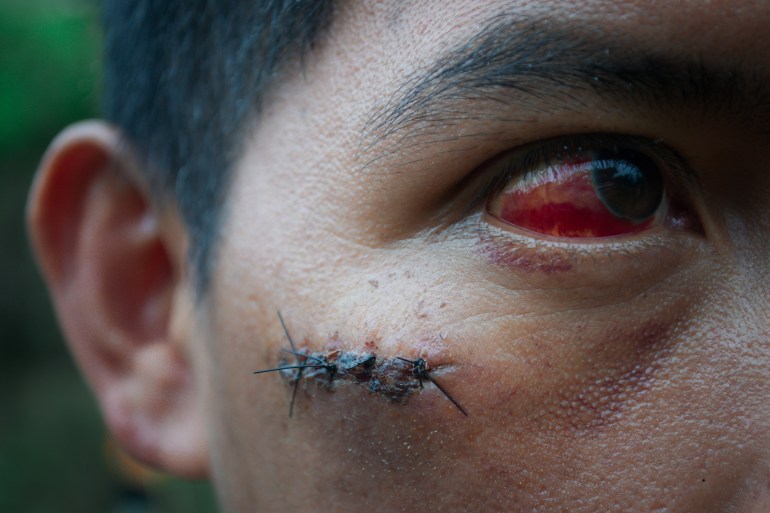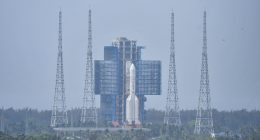Las Pampas, Ecuador – The alarm rang at 7am, summoning everyone in the main square. Protesters boarded three trucks, normally used to transport livestock. The convoy carried them close to the nearby town of Palo Quemado, home to the mining project of La Plata in northwestern Ecuador, 130km (81 miles) from the capital Quito.
Since last July, this quiet community has turned into an epicentre of anti-mining protests.
Under the sight of military men stationed on the crest of the hill, roughly 100 demonstrators approached the road into town. But a whole riot squad blocked their way.
“We don’t want mining, and we will exert our right to resist every day,” 33-year-old farmer Rolando, who asked to use a pseudonym, told Al Jazeera. A resident of Las Pampas, there were stitches under his right eye. He says the police shot him right in the face with a canister of tear gas.
Since 1996, mining companies have been exploring the area around Palo Quemado, discovering deposits of gold, silver, copper and zinc. In 2020, Atico Mining, a Canadian firm, stepped in and started drilling for exploration after having obtained a concession from the Ecuadorian government until 2049.
It now wants to ramp up and start building facilities and expects to start exploitation of the deposit in 2026. According to the Central Bank of Ecuador, Atico Mining plans to invest $75.9m until 2025.
However, some local farmers fear that mining operations could affect the availability and quality of water.
“Our earth remains green every day of the year. It gives us fruits daily. Mining would endanger the source of income that sustained us for decades and decades,” 47-year-old farmer Luis Martinez from Las Pampas told Al Jazeera.
The area is renowned for producing high-quality meat and raw cane sugar, which is also exported to Europe.
“The explosions will pollute the air, and the water inside the slopes will decrease due to the boring of tunnels,” Martinez said.
Atico Mining stressed that it cares for the sustainable development of the local community, and it adheres to strict standards of responsible mining.
The La Plata project will be provided with state-of-the-art infrastructure, such as a tailing facility that will allow for efficient use of water by recirculating “a large portion of the water needs for the processing plant”.
Additionally, the company says it has funded the refurbishment of the local potable water system and is backing innovative agricultural projects.
But people in Las Pampas remain sceptical. Berta Chiribogan, 63, has been raising cattle and farming cane sugar since she was young. She is convinced that mining will end their way of life.
“We don’t believe them. We already had mining here, and the water was left polluted. Before micay [carpet grass] and sugarcane grew there. Nowadays, nothing springs up there,” she told Al Jazeera.
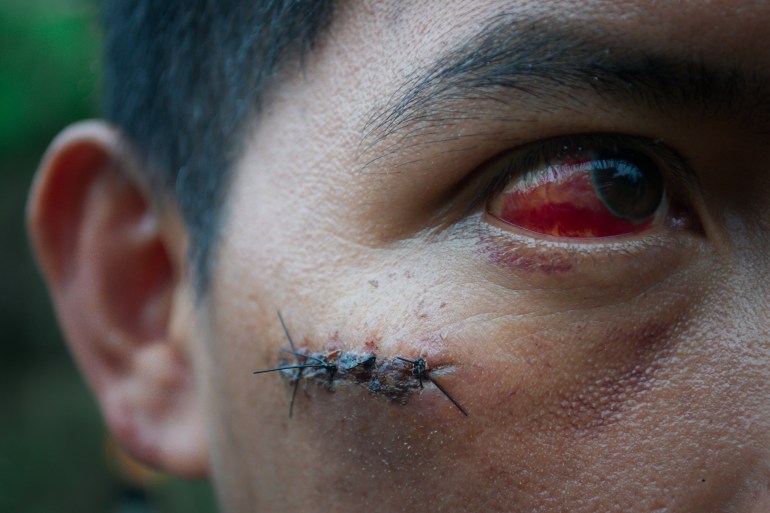
‘Crucial driver for the economy’
At the beginning of March, President Daniel Noboa travelled to Canada to join the annual conference of the Prospectors and Developers Association of Canada (PDAC), the world’s largest mining convention.
With more than half of global mining companies based in Canada and 15 of them currently developing projects in Ecuador, PDAC represented a juicy opportunity for drawing more foreign financing.
“Mining attracted over $4bn investment, so I define its role as a crucial driver for the economy, benefitting the country through job creation, income for communities, local governments and the state,” said Noboa in front of representatives of the major companies.
The government subsequently signed six contracts for further developing sustainable mining projects for an overall value of $4.8bn. La Plata was among them.
The agreement included the facilitation of securing all requisite approvals, licenses and permits.
These contracts are “made to provide legal security to considerable investment, especially of international investors”, member of the Ecuadorian Chamber of Mining Roberto Izurieta told Al Jazeera, who believes that Ecuador must make an effort to regain the trust of foreign investors.
“Mining does not represent the future of Ecuador, but its present,” Mining Deputy Minister Andres Delgado told Al Jazeera.
According to the Ecuadorian Chamber of Mining, mineral exports rose by 19 percent in 2023, reaching $3.3bn. Mining also accounts for 51 percent of foreign investment in the country.
Soon, the global energy transition towards a greener economy will need massive amounts of rare minerals such as lithium, nickel, cobalt, manganese, graphite and copper. Delgado sees this as an unmissable opportunity. “We have deposits with an enormous potential in copper and, surprisingly, in lithium, too,” he said.
Ecuador has so far concessioned 1,300sq kilometres (502sq miles) of its territory for mining activities, mostly in the region of Morona Santiago. Only two mines – the Chinese-owned Mirador and Canadian Fruta del Norte – operate at an industrial scale. Another 10 projects are currently under development in various regions.
“We are interested in attracting investments from committed private actors and countries with social and environmental standards higher than here,” Delgado said, stressing the importance of creating job opportunities in impoverished communities.
According to the National Institute of Statistics, 42.2 percent of the population in rural areas live under the poverty line and 79.2 percent work in the informal sector.
In 2023, the mining sector generated 96,800 jobs between direct and indirect employment. The government expects that number to go up vastly as mining expands.
Environmental consultations
However, the Confederation of Indigenous People of Ecuador (CONAIE) scorned the agreement reached in Canada, accusing mining companies of leaving only “pollution and underdevelopment” in Indigenous territories.
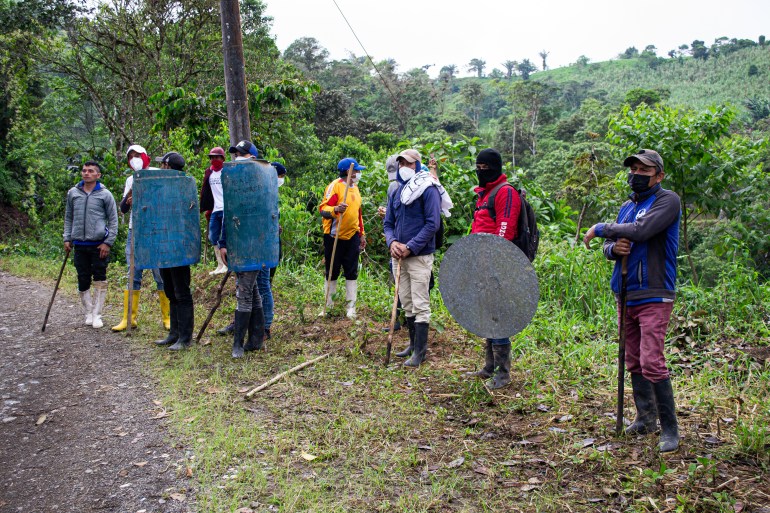
In a national meeting with anti-mining protesters from all over the country held on March 22 in Quito, CONAIE pledged to fight back mining companies on the ground and in courts, launching a national mobilisation in support of the protests in Palo Quemado.
To become fully operational, La Plata must receive an environmental license from the Ministry of Environment, Water, and Ecological Transition (MAATE). This process includes holding an environmental consultation with residents about any possible negative impact.
On March 19, the government set up an information booth in town. The consultation summons the residents of the two precincts in Palo Quemado that are considered areas of direct influence.
But residents in nearby Las Pampas, which is not considered an area of direct influence, fear the excavation will have an impact on them, too.
“The concession includes territory in Las Pampas, too,” Martinez said, “but they don’t let us say anything.”
The residents believe the consultation is unjust because all critical voices have been excluded. They claim that only 70 out of 1,100 residents will present their opinion.
Communities torn apart
Las Pampas is 17km (11 miles) away from Palo Quemado. While in Las Pampas the community is completely against drilling, some residents in Palo Quemado see it as an opportunity for drawing funding into the community.
“Anti-mining protesters are just two or three local families who joined the people of the nearby parish of Las Pampas and the Indigenous movement of Cotopaxi,” resident Victor Toce, 60, told Al Jazeera.
Toce is the president of the local Council for the water administration. He believes that most of the residents share his belief. “Population is increasing in Palo Quemado and there are no jobs,” he said, “If international investors come here and provide our sons with an opportunity, it’s good to me.”
But Rosa Masaparte, another resident, is deeply critical of such a statement. She was president of the local parish, and in an informal survey among the dwellers, she found that they opposed the mining. “People don’t dare to speak. They fear reprisals from those who are in favour,” she told Al Jazeera.
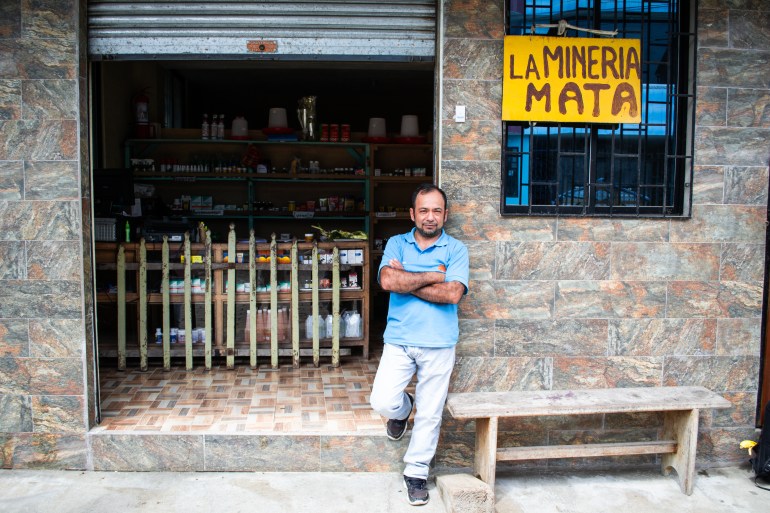
After the Ministry of Environment set up the infopoint, the situation quickly deteriorated. On March 18, activists from the National Anti-Mining Front posted photos of a riot squad in Palo Quemado, claiming that 500 policemen were summoned to carry out the consultation.
Security forces and protesters clashed several times in the following days. On March 26, farmer Mesias Robayo Masapanta was shot in the face with pellets and hospitalised in a coma in the hospital of Santo Domingo, the CONAIE said. The government quickly denied any use of fire weapons or pellets.
That same night, the head of the Joint Command of the security forces, Jaime Vela, said a group armed with Molotov cocktails, shields and homemade explosives injured 37 members of the security forces. He labelled such acts as “terrorist acts”.
The Ecuadorian Chamber of Mining believes that protests are politically motivated. “We are in an electoral period and there are groups which are utterly against mining and have lost political space, so they are trying to recover,” Chamber President Maria Eulalia Silva told Al Jazeera.
Al Jazeera asked La Plata Mining for a comment about the consultation. They declined to answer because they said that this is a process carried out by the Ministry of Environment and they have no direct involvement in it.
In the middle of the turmoil, the Autonomous Government of the canton Sigchos filed a legal complaint against the consultation. A local judge finally suspended the process.
Mining boosted by free trade
Controversies such as the one in Palo Quemado increasingly worry Canadian humanitarian organisations because Ecuador is trying to sign a free trade agreement with their country.
During his visit to Canada, Noboa met Prime Minister Justin Trudeau. They both agreed on opening talks for a future free trade agreement. According to Sonsoles Garcia, minister of production and foreign trade, this could further boost Ecuadorian exports by 8 percent and create about 40,000 new jobs.
Canadian investment in Ecuador has tripled in the last five years and topped $2.6bn in 2022, making Canada the largest foreign investor in the country.
“All the socio-environmental conflicts that are already happening in Ecuador, related to Canadian mining projects, are going to increase if a pre-trade agreement is signed,” said Viviana Herrera, Latin America programme coordinator for the NGO, MiningWatch Canada.
Regardless of what the Ecuadorian government will decide, protesters in Las Pampas show no sign of giving up.
The Sunday before the protest revived, Las Pampas’ dwellers gathered in the main square to play volleyball and enjoy the evening breeze. Here, the mine is the main conversation argument. And nobody has good words for it.
“I hope that the national government will listen because this conflict is putting community against community, friend against friend, family against family,” Martinez said.
Read More: World News | Entertainment News | Celeb News
Aljazera

